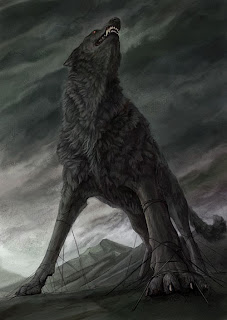In many ancient myths, the wolf was portrayed as brave, honorable, and intelligent. some of the best examples of this high regard comes from Native American folklore and tradition of ancient Rome (see the legend of Romulus and Remus and Lupercalia).
 |
| Picture taken in AlphaLoups, Le Boréon, Mercantour National Park |
Many names of Germanic origin, contain the element "Wulf" or "Wolf", for example, Wulfstan, Wolfgang, Wolfthard.
In the modern western folklore, the wolf is a figure to be feared, as the Big Bad Wolf or werewolves, humans, through an evil spell or a curse, take the shape and behavior of wolves, and are then discriminated and emrginati by their (ex) like.
 |
The fear of man against the wolves is responsible for all the persecution that our race has given to these proud animals, as well as the justification for bringing him to the brink of extinction in many parts of the planet. Fortunately, during the twentieth century, a greater knowledge habits of this animal, and a growing interest in the traditions and folklore of Native Americans, led to a much more positive picture in the wolf.
Despite their often negative reputation, is sometimes attributed to wolves in mythology or stories (as well as the detection of straight lines) used to protect and grow to save lost children, all between two famous examples, the above mentioned Romulus and Remus and Mowgli, the protagonist of "Jungle Book" Kipling.
In their mythology, the Mongols believed to be descended from a gray wolf and a white doe. Their greatest leader, Genghis Khan, liked to call his people "The Clan the gray wolf. "
Over the past 150 years, there has been no documented evidence of a human being killed by a healthy wolf, wolves in fact prefer to escape rather than attack a man. However, we speak the same attacks by wolves, which is probably attributable to animals infected with rabies, however, or even a large feral dogs. It 'always good to think twice before causing one or more wolves in the event of accidental encounters, seeing these wonderful animals are wild, and if they perceive danger to themselves or worse for their children, attacking defense.
0 comments:
Post a Comment